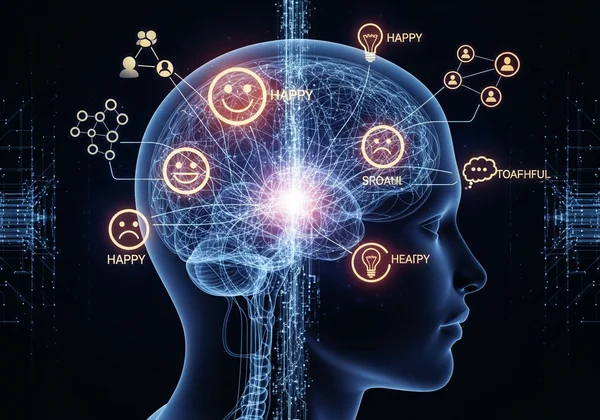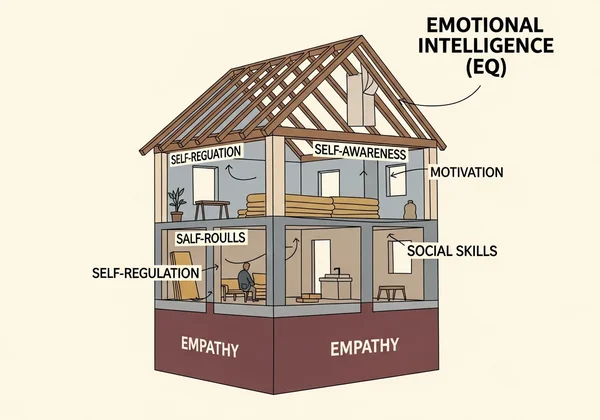Empathy Test & EQ: Why Both Boost Your Success
August 4, 2025 | By Penelope Dean
Ever wonder how some people effortlessly navigate social situations or lead teams with grace? It's often thanks to a powerful blend of emotional intelligence and empathy. While these terms are often used interchangeably, they represent distinct yet interconnected skills that are vital for success. If you've ever asked yourself, "How do I know if I'm empathetic?", understanding the roles of both EQ and empathy is the first step. This article will clarify what these crucial skills are, how they differ, and why mastering both is essential for your personal and professional growth. The journey to self-awareness starts with a single step, and a great way to begin is by taking a comprehensive empathy test to establish your baseline.
What is Emotional Intelligence (EQ)?
Emotional Intelligence, or EQ, is the ability to perceive, understand, manage, and use emotions to facilitate thinking and navigate social complexities. It's a broad skillset that governs how we recognize our own feelings and those of others, using this awareness to guide our behavior and relationships. Think of EQ as the operating system for your emotional world; it helps you process information and respond effectively, rather than being controlled by your immediate reactions. Cultivating a high EQ empowers you to unlock greater personal fulfillment and accelerate your professional growth.

The Core Components of Emotional Intelligence
Psychologists generally agree that Emotional Intelligence is built on five key pillars. Understanding these components helps to see why it's such a powerful asset:
- Self-Awareness: The ability to recognize and understand your own moods, emotions, and drives, as well as their effect on others.
- Self-Regulation: The capacity to control or redirect disruptive impulses and moods, and the ability to think before acting.
- Motivation: A passion for work for reasons that go beyond money or status, and a propensity to pursue goals with energy and persistence.
- Empathy: The ability to understand the emotional makeup of other people. This is a critical skill for treating people according to their emotional reactions.
- Social Skills: Proficiency in managing relationships and building networks, and an ability to find common ground and build rapport.
Why EQ is Crucial for Personal & Professional Life
A high EQ is a game-changer in nearly every aspect of life. In your personal life, it fosters deeper, more meaningful relationships with friends and family. It allows you to communicate your needs clearly and understand the needs of others, leading to less conflict and stronger bonds.
In the professional world, strong emotional intelligence is consistently linked to better job performance, leadership effectiveness, and career advancement. Leaders with high EQ can inspire and motivate their teams, manage change effectively, and build a positive work culture. For any professional, EQ improves collaboration, negotiation, and client relationships, making it one of the most sought-after soft skills in today's workforce.
Understanding Empathy: More Than Just Feeling
Empathy is the cornerstone of Emotional Intelligence, but it is also a distinct skill in its own right. It is the ability to sense other people’s emotions, coupled with the ability to imagine what someone else might be thinking or feeling. It's about putting yourself in another person's shoes and seeing the world from their perspective. A great way to begin this journey is with an online empathy test.
Empathy goes beyond sympathy, which is feeling pity or sorrow for someone else's misfortune. Empathy is about sharing the feeling, not just observing it from a distance. This capacity for connection is fundamental to human interaction and forms the bedrock of trust and communication.
Cognitive Empathy vs. Emotional Empathy: Key Differences
Empathy isn't a single, monolithic trait. It is generally broken down into two main types, which work together to create a complete empathetic response:
- Cognitive Empathy: This is the "thinking" part of empathy. It involves understanding someone else's perspective or mental state on an intellectual level without necessarily sharing their emotions. It’s about knowing how they feel and what they might be thinking. This skill is crucial for effective communication, negotiation, and motivating others.
- Emotional Empathy: This is the "feeling" part. It’s when you physically feel the other person’s emotions as if they were your own. This type of empathy helps you build deep, personal connections and rapport with others. It's the force behind our most genuine bonds.
A third type, compassionate empathy, moves beyond thinking and feeling into action. It combines both cognitive and emotional empathy and motivates us to help if we can.
The Power of Empathy in Connection and Communication
Empathy is the glue that holds relationships together. When people feel seen, heard, and understood, trust flourishes. In any conversation, empathy allows you to listen more deeply and respond more thoughtfully, preventing misunderstandings and fostering collaboration.
Whether you're a manager trying to understand your team's challenges, a parent connecting with your child, or a friend supporting someone through a tough time, empathy is your most powerful tool. It transforms simple interactions into opportunities for genuine human connection. The first step to harnessing this power is to test your empathy.

Empathy vs. Emotional Intelligence: How They Intersect
The key to understanding the relationship between empathy and EQ is to recognize that empathy is a foundational component of emotional intelligence, but it is not the whole picture. You cannot have high emotional intelligence without empathy. However, having empathy alone does not guarantee a high EQ.
Think of it like building a house. Empathy is the foundation—it's absolutely essential, and nothing can be built without it. Emotional intelligence, however, is the entire structure built upon that foundation: the walls (self-regulation), the roof (social skills), the wiring (self-awareness), and the plumbing (motivation). A strong foundation is critical, but it isn't a complete house.

Empathy as a Pillar of Emotional Intelligence
Without the ability to understand what others are feeling (empathy), you cannot effectively manage your relationships (social skills) or regulate your own emotional responses in social contexts (self-regulation). Empathy provides the crucial data about the emotional landscape around you. EQ is what allows you to use that data to make effective decisions.
A manager might use empathy to sense that their team is feeling burnt out. Their broader emotional intelligence then enables them to regulate their own frustration, communicate a new plan with clarity, and motivate the team toward a more sustainable goal.
When Are They Used Differently? Practical Examples
While they work together, you can see their distinct roles in action. A therapist might rely heavily on emotional empathy to connect with a client's distress. However, they must use their self-regulation (part of EQ) to avoid becoming overwhelmed by those emotions so they can provide effective guidance.
Conversely, a skilled negotiator might use cognitive empathy to understand the other side's motivations and priorities without getting emotionally invested. This allows them to stay strategic and objective. They need the complete EQ toolkit to close the deal successfully, but cognitive empathy is the specific tool they are using in that moment. To see where you stand, why not take the empathy test?
Developing Both EQ and Empathy for Greater Success
The encouraging truth is that both empathy and emotional intelligence are not fixed traits. They are skills that can be learned, practiced, and strengthened over time. Committing to developing them is an investment in every area of your life.
A powerful starting point is self-assessment. An online empathy scale online can give you valuable insights into your current strengths and areas for growth, providing a personalized roadmap for your development journey.
Strategies to Cultivate Your Emotional Intelligence
Improving your overall EQ involves a holistic approach. Here are a few strategies to get started:
- Practice Mindfulness: Pay attention to your emotions without judgment. This builds self-awareness.
- Keep a Journal: Write down your feelings and what triggered them to better understand your emotional patterns.
- Pause Before Responding: In stressful situations, take a deep breath before you speak or act. This strengthens self-regulation.
Actionable Ways to Strengthen Your Empathy Muscle
Building empathy requires you to intentionally step outside of your own perspective. Try these exercises:
-
Practice Active Listening: In conversations, focus completely on what the other person is saying. Try to understand their perspective before forming your own response.
-
Read More Fiction: Studies show that reading literary fiction enhances our ability to understand the thoughts and feelings of others.
-
Challenge Your Biases: Make an effort to talk to people from different backgrounds and cultures to broaden your perspective.

Elevate Your Emotional Skills & Discover Your Empathy Score
Emotional intelligence and empathy are the twin engines of personal and professional success. While EQ is the broad capacity to manage emotions, empathy is the foundational ability to connect with others. Both are essential, and strengthening one often improves the other.
The journey toward greater emotional mastery begins with self-awareness. Understanding your empathetic tendencies is the first, most crucial step. Ready to begin? Discover your empathy score today and unlock personalized insights to guide your growth. Take our free, psychology-based empathy test and start building a more connected and successful life.
Frequently Asked Questions About Empathy & Emotional Intelligence
How do I know if I'm empathetic?
Self-reflection is a good start. Ask yourself if you often consider other people's feelings or find yourself imagining what it's like to be in their situation. However, for a more objective measure, a well-designed assessment is invaluable. An online empathy quiz can provide structured feedback on your empathetic traits, highlighting both your strengths and potential blind spots.
Is there a reliable emotional intelligence test available?
While many comprehensive EQ tests exist, they can be complex. A great starting point is to focus on its most critical component: empathy. Since empathy is the foundation of EQ, assessing it provides powerful and actionable insights. Our free online empathy test is designed based on psychological principles to give you a reliable measure of this core skill.
What are the 3 types of empathy?
The three primary types are Cognitive Empathy (understanding another's perspective), Emotional Empathy (feeling another's emotions), and Compassionate Empathy (being moved to help). A balanced person utilizes all three. For example, you use cognitive empathy to understand a colleague is stressed about a deadline, emotional empathy to feel their anxiety, and compassionate empathy to offer assistance.
Can a person without empathy learn to be more empathetic?
Absolutely. While some people may have a natural disposition toward lower empathy, it is a skill that can be developed through conscious effort. Practices like active listening, exposing yourself to different perspectives through stories or conversations, and mindfulness can build new neural pathways. The first step is awareness, which is why an initial assessment like an empathy quotient test can be so empowering.